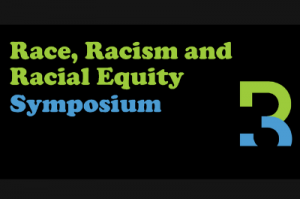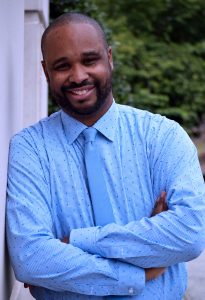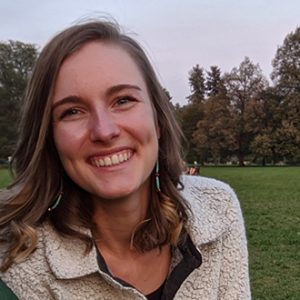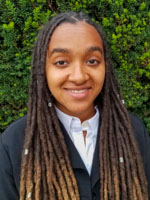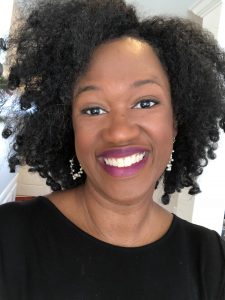R3 #6: Scholarship Addressing the Dual Pandemic of Racism and COVID-19
Our sixth event in the R3 series, “Scholarship Addressing the Dual Pandemic of Racism and COVID-19, “took place on April 19, 2022. The event focused on the fact that the United States has been in a crisis – a pandemic caused by racism – since our very beginnings. COVID-19 has highlighted these racial inequities. While the pandemic is an international experience that touches everyone, the impact of COVID-19—physically, emotionally, and economically—is not equal. Scholars from UNC’s Schools of Education, Public Health, and Social Work presented research on the coping strategies of Black women essential workers and their experiences with racism during the COVID-19 pandemic, advancing equity through public health critical race practice, and Black parent perspectives of school experiences during COVID.
MODERATOR:
TRAVIS ALBRITTON is a Clinical Associate Professor and Associate Dean for Diversity, Equity and Inclusion at UNC-CH’s School of Social Work. He is the Director of the Chapel Hill 3-Year MSW Program and the Faculty Liaison for the Dual Degree MSW/M.Div. program. Dr. Albritton is a two-time recipient of the School of Social Work Excellence in MSW Advising Award. He has also received the School of Social Work Excellence in Teaching Award and has been recognized numerous times with the dean’s recognition for excellence in teaching. Dr. Albritton is the chairperson for the School of Social Work diversity committee and he serves on the University’s Diversity, Equity and Inclusion Council. Dr. Albritton was selected by the Council on Social Work Education to receive a competitive scholarship to participate in the Management Development Program offered by the Harvard Graduate School of Education. The program is designed to prepare mid-level managers to address the complex issues faced by leaders in higher education. His research interests include educational equity in K-12, academic achievement among Black males and the importance of closing educational opportunity gaps for children of all ages. He has presented nationally on various topics including Critical Race Theory, the importance of critical conversations in the classroom and the educational needs of Black male high school students.
PANELISTS:
SARAH BOLAND, MPH, is a Doctorate in Public Health (DrPH) candidate in the Department of Community & Behavioral Health. She is also a Certificate in Total Worker Health® candidate in the Department of Environment & Occupational Health, funded by the Mountain and Plains Education and Research Center. Sarah currently works as a student assistant on two research projects in the Centers for American Indian & Alaska Native Health that focus on substance use prevention in young, native populations. As a student committed to health equity and social justice, she is involved in the school-wide Inclusive Excellence Committee and the departmental Racial Justice Committee. Prior to joining the university, Sarah worked in social and behavioral research at the NIH and in substance use prevention in local county public health. Much of her work has been in social psychology, community-based practices, and mental health promotion. She holds a BA in biophysics and Health Behavior and an MPH in leadership in practice from the University of North Carolina Chapel Hill.
MAYA BRACY is a 1st year Ph.D. student in the Applied Developmental Science and Special Education Program at UNC-Chapel Hill’s School of Education, where she works under the mentorship of Dr. Roger Mills-Koonce and Dr. Dana Griffin. She received a B.A. in Psychology with a concentration in Africana Studies from Williams College and completed a Postbaccalaureate IRTA program with the National Institute of Mental Health and University of Maryland’s School of Education. With a background in child development, Maya is interested in studying child social, emotional, and biobehavioral development within the greater context of community care systems to strengthen their impact on marginalized populations.
Dr. RACHEL GOODE is an Assistant Professor at the School of Social Work and in the Center for Eating Disorder Excellence at the University of North Carolina at Chapel Hill. She received her PhD, MPH, and MSW degrees from the University of Pittsburgh. Her research interests include developing, implementing, and evaluating interventions to improve health equity in the implementation of treatments of eating disorders and obesity. Additionally, Dr. Goode is a licensed clinical social worker and has practice experience with the treatment of eating disorders and obesity among clients in university counseling centers, and community-based mental health agencies. Her ongoing projects include an NIH Career Development Award (K23129832) to develop a culturally relevant digital health treatment for binge eating for Black women. She is also a past Feeding Hope Grant recipient from the National Eating Disorders Association for a project designed to test the feasibility of an appetite awareness program and lifestyle intervention to prevent binge eating disorder among African American women in primary care.
MEGHAN GREENE is a third-year doctoral student in School Psychology in the School of Education. Her research interests focus on promoting mental health in school settings, including assessments and interventions that address internalizing disorders and support adolescent social and emotional well-being, particularly in Black and low-income populations. Meghan received her bachelor’s degree from Duke University and master’s degree from the University of Texas at Arlington.
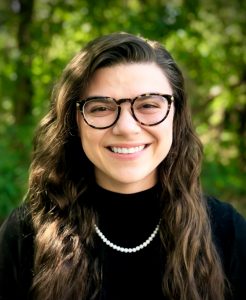 HANNA HUFFSTETLER is a PhD student in the Department of Health Behavior at the UNC Gillings School of Global Public Health where she is also a graduate teaching assistant and co-leads research on health and human rights. Her work examines the impacts of legal and policy interventions on community health, and community-centered approaches to intervention development and implementation. She currently co-leads a project that systematically monitors media coverage of potential human rights violations in national public health responses to the COVID-19 pandemic. As a part of this work, the team recently launched the UNC COVID-19 Health and Human Rights Monitor – a free online tool that offers an interactive and searchable repository of our data, which we hope will provide a foundation for future research and advocacy.
HANNA HUFFSTETLER is a PhD student in the Department of Health Behavior at the UNC Gillings School of Global Public Health where she is also a graduate teaching assistant and co-leads research on health and human rights. Her work examines the impacts of legal and policy interventions on community health, and community-centered approaches to intervention development and implementation. She currently co-leads a project that systematically monitors media coverage of potential human rights violations in national public health responses to the COVID-19 pandemic. As a part of this work, the team recently launched the UNC COVID-19 Health and Human Rights Monitor – a free online tool that offers an interactive and searchable repository of our data, which we hope will provide a foundation for future research and advocacy.
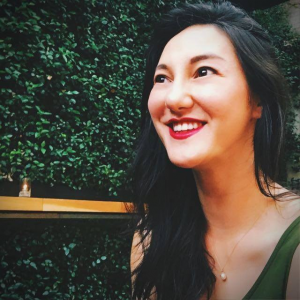 CAITLIN R. WILLIAMS (she/they) is a PhD candidate in the Department of Maternal and Child Health at the UNC Gillings School of Global Public Health. Her research centers on scaling and sustaining policies, programs, and practices that advance sexual and reproductive health, rights, and justice. At Gillings, Caitlin has been a champion for diversity, equity, and inclusion, serving on the School’s Inclusive Excellence Council, Inclusive Excellence Strategic Planning ad hoc working group, and as a past Co-President of the Minority Student Caucus. She has written on anti-racist and humans rights-based pedagogies for public health students, as well as how to advance anti-racism in research. Outside of Gillings, Caitlin has served as a member of the American Journal of Public Health’s 2019 Student Think Tank, the CDC’s National Preconception Health and Health Care Initiative Consumer Workgroup, and the Advisory Committee to the National Maternal and Child Health Workforce Development Center. She is currently a Research Collaborator with the Black Mamas Matter Alliance. Caitlin earned an MSPH in Maternal and Child Health and a BA in Global Studies from UNC-Chapel Hill. She is a Royster Fellow, a CoreAlign Speaking Race to Power Fellow and Generative Fellow, and Robertson Scholar.
CAITLIN R. WILLIAMS (she/they) is a PhD candidate in the Department of Maternal and Child Health at the UNC Gillings School of Global Public Health. Her research centers on scaling and sustaining policies, programs, and practices that advance sexual and reproductive health, rights, and justice. At Gillings, Caitlin has been a champion for diversity, equity, and inclusion, serving on the School’s Inclusive Excellence Council, Inclusive Excellence Strategic Planning ad hoc working group, and as a past Co-President of the Minority Student Caucus. She has written on anti-racist and humans rights-based pedagogies for public health students, as well as how to advance anti-racism in research. Outside of Gillings, Caitlin has served as a member of the American Journal of Public Health’s 2019 Student Think Tank, the CDC’s National Preconception Health and Health Care Initiative Consumer Workgroup, and the Advisory Committee to the National Maternal and Child Health Workforce Development Center. She is currently a Research Collaborator with the Black Mamas Matter Alliance. Caitlin earned an MSPH in Maternal and Child Health and a BA in Global Studies from UNC-Chapel Hill. She is a Royster Fellow, a CoreAlign Speaking Race to Power Fellow and Generative Fellow, and Robertson Scholar.
VIEW PRESENTATION FROM BOLAND, HUFFSTETLER & WILLIAMS
VIEW PRESENTATION FROM BRACY, GREENE & BLACK
Resources:
School of Public Health team:
- The Carolina Graduate Certificate in Innovation for the Public Good (CIPG) provides an opportunity for graduate students across the UNC campus to receive training in design and innovation methods. Learn more about CIPG here: https://innovate.unc.edu/carolina-graduate-certificate-in-innovation-for-the-public-good/
- Huffstetler HE, Boland SE, Williams CR, Rice DK, and Ramaswamy R. (2022). Beyond Virtue-Signaling: Advancing Equity Through Design Justice and Public Health Critical Race Praxis. Health Equity, 6(1), 21–26.
- Ford CL, Airhihenbuwa CO. (2018). Just What is Critical Race Theory and What’s It Doing in a Progressive Field Like Public Health? Ethnicity and Disease, 28(Suppl 1), 223.
- Design Justice Network (Design Justice principles and ways to get involved): https://designjustice.org/
School of Education team:
- https://ct.counseling.org/2012/05/the-need-for-advocacy-with-african-american-parents/
- https://www.cdc.gov/healthyyouth/protective/school_connectedness.htm
- https://www.pbs.org/parents/thrive/the-parent-teacher-partnership
- https://www.ednc.org/perspective-five-tips-for-offering-gratitude-and-support-for-the-teachers-helping-our-children/
- School-Family-Community Partnerships for Educational Success and Equity for Black Male Students
Related Feature:
Previous R3 Symposia:
The symposium highlighted scholarship from UNC graduate students, research scientists, and faculty from the School of Government, the School of Education, and the School of Public Health. Their work examines racial equity interventions used to dismantle systems of oppression and can help us understand what actions can disrupt racism and create more just systems. Equitable practices call us to center the communities most impacted by our research. Two of the UNC scholars were joined by their community partners to share their experiences with community-university partnerships.
Environmental racism takes many forms, from higher rates of pollution and stormwater issues in BIPOC communities to racist planning policies that lead to gentrification and displacement, and white supremacist investments in automotive-centric transportation systems. This fourth R3 symposium highlighted scholarship addressing environmental justice and climate action from UNC graduate students, research scientists and faculty from Epidemiology, Public Health, Social Work and Urban Planning.
ARTivism: Using Arts-Based Scholarship to Interrogate and Dismantle Racism (Feb. 24, 2021)
The arts can help us better understand systems of oppression and their impacts, challenge white supremacy, foster dialogue around race and racism, and advance racial equity. This event highlighted work by UNC scholars and current and former graduate students to do just that through a variety of artistic genres, including performance, storytelling, music, painting, and photography. We were also honored to include a spoken word performance by Chapel Hill’s inaugural Poet Laureate, CJ Suitt.
In this second event in the series, scholars from across UNC, including Business and Communications, shared their work addressing issues of language, representation, cultural appropriation, and decontextualization of Black and Brown labor as it appears through a variety of media.
R3 co-convener Allison De Marco, Equity Lead, Jordan Institute for Families, School of Social Work and Advanced Research Scientist, Frank Porter Graham Child Development Institute, noted, “Our goal for the R3 symposium has always been to feature the important research happening across campus to make systems of oppression visible and this continues with the second in our series. In this panel, we will feature scholarship from both our faculty and our doctoral students, whose work brings to light the way that capitalist systems perpetuate cultural appropriation, decontextualization and uncompensated labor.”
R3 co-convener Allison De Marco, Equity Lead, Jordan Institute for Families, School of Social Work and Advanced Research Scientist, Frank Porter Graham Child Development Institute, noted, “Our goal for the R3 symposium was always to feature the important research going on across campus addressing race and racial equity and to foster cross-disciplinary collaboration. We plan to continue this idea through a series of virtual events that will both highlight this work and help us all to understand our role in dismantling systems of oppression.”
Related Stories:
- “Race, Research & Reckoning” (Sept. 14, 2020)
- “Cultural Industry, Techno-capitalism, and Labor: The Mediated Exploitation of Black and Brown Bodies” (Nov. 11, 2020)
- “R3 ARTivism Explores the Power of the Arts in Confronting White Supremacy (Mar. 2, 2020)
- “Race, Racism and Racial Equity Symposium hosts fourth seminar for UNC community” (Sept. 12, 2021)
- “R3 Examines Systems of Oppression in Justice, Education and Health” (Dec. 24, 2021)


